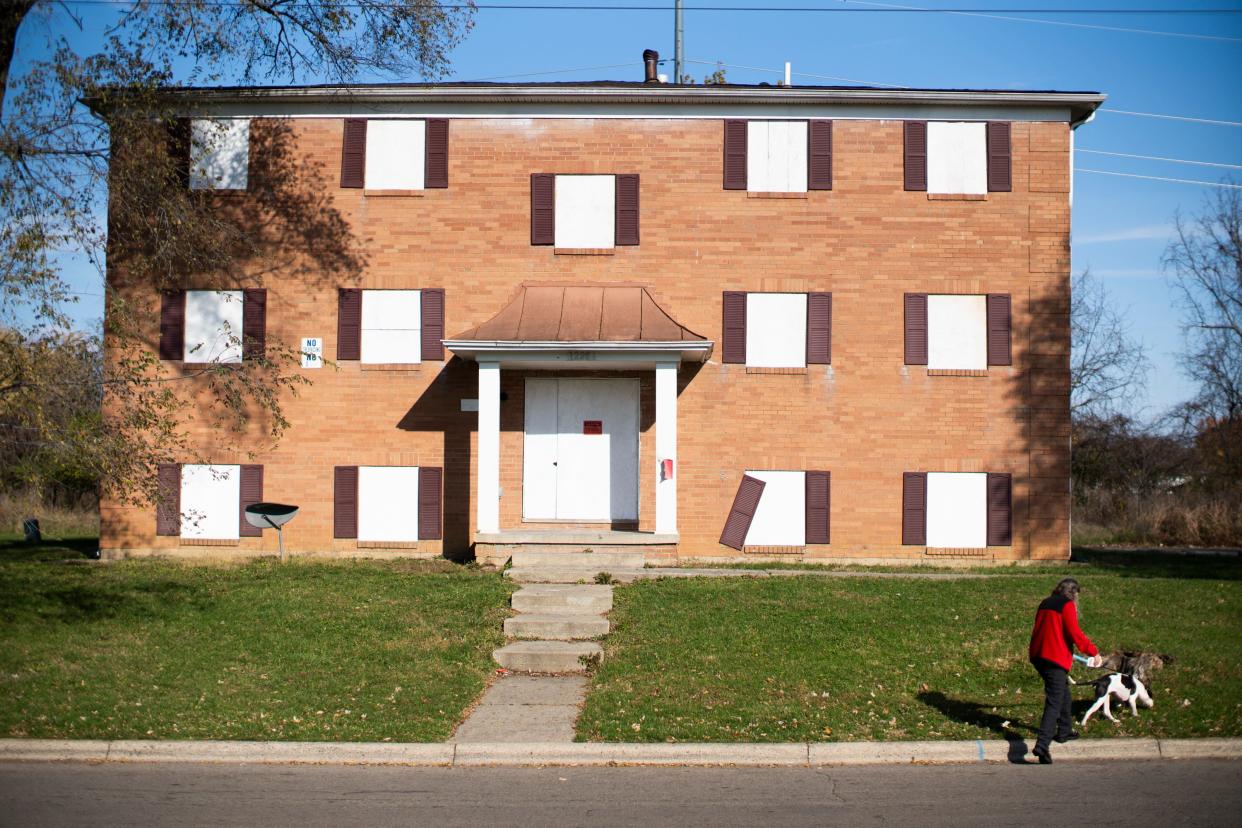After 850 Haitians fell victim to housing scam, city attorney files legal case

- Oops!Something went wrong.Please try again later.
After hundreds of Haitian asylum seekers fell victim to a scam to rent cold, unsafe Columbus apartments, City Attorney Zach Klein on Tuesday issued a legal challenge to the former property manager, lender and court-appointed receiver who controls the property.
As The Dispatch reported on Friday, over 850 Haitians have been living for months in apartments at Colonial Village on Columbus’ East Side, many of which lack official leases and basic amenities like heat and hot water. A network of human traffickers who brought the asylum seekers to Columbus from Florida collected cash rent for those units until recently and gave residents fraudulent rental agreements — which simply named “Colonial Village Apartments” as the landlord.
At least nine units that have families with children under the age of 1 still lack heat, a smoke detector or have other violations, according to Klein’s spokesperson Pete Shipley. He said those high-priority families will be relocated beginning today.
Klein’s office on Tuesday issued a motion to name the property’s mortgage holder, EFM Transfer Agent; its receiver, Kenneth Latz, Senior Managing Director of Riveron ETS LLC; and its former property manager, Hayes Gibson, as defendants in a long-running environmental health case regarding the property, which has faced years of complaints. It is seeking to hold them in contempt of a court order mandating improvements in safety, security and living conditions at the complex.
The environmental case was first brought in 2021 against the owner, Apex Colonial OH LLC, which lost control to receivership amid a separate foreclosure case in early 2022. Another Columbus developer, Robert J. Weiler Sr., was initially appointed receiver, but Latz replaced him in April 2023.
Klein’s office had given EFM and Latz until Nov. 10 to present a plan either to swiftly bring units into compliance or cover costs associated with relocating residents. EFM and Latz have declined to cover the costs for relocation, and many units still have outstanding emergency violations, according to Klein’s office.
Columbus police units have confiscated documents and a computer from the former property manager, Hayes Gibson, which was in charge of the property when many of the Haitians moved in. The firm has since been banned from the premises, according to Klein's office.
“The lender, receiver, and former property manager took their eyes off the ball and fell short of their obligations to the city, to residents, to the neighborhood, and to the Court. Now, hundreds of residents are left wondering if they’ll have a safe, clean place to live and care for their families. Those responsible for the care of this property need to be held accountable, and taxpayers shouldn’t be on the hook,” Klein said in a written statement.
John Gall, an attorney for EFM, countered Klein's claim, saying the lender was "a wholly innocent party" and had learned about the situation only on Oct. 12. He said EFM has been trying to rehabilitate the property as affordable housing.
"For the city to say that they're going to come after EFM, which was trying to put money into that project and build it back up again, is extremely counterproductive and unfortunate," he said.
A spokesperson for Latz and his firm, Riveron, did not respond directly to Klein's allegations against the receiver but said the firm is assisting the city in its investigation into the housing scam.
A representative of Hayes Gibson, which appears to share personnel and offices with a larger real estate company, California-based Allied Argenta, did not respond to requests for comment.
Referencing the Latitude Five25 apartments on Columbus’ Near East Side — where over 150 residents were forced to relocate after the building was deemed unsafe last December — Klein said, “Latitude Five25 gave us an effective roadmap to quickly mobilize a response, but Colonial Village has unique challenges, from the sheer number of affected individuals to a significant language barrier in many of these cases.”
The city first learned about the situation on Oct. 13, according to Tony Celebrezze, the city’s deputy director of Building and Zoning Services.
A new management company, Capstone, took over from Hayes Gibson at the end of October and has been working with the city to address emergency code violations, according to Klein’s office.

Sorailla Duquerette, a translator who has been helping social workers communicate with Creole-speaking Haitians at Colonial Village, said she hopes the Haitian residents who paid rent to scammers can get their money back.
She said that multiple actors are to blame for the current situation, and the city bears at least partial responsibility for not doing enough monitoring to prevent the crisis.
“There's multiple players, and there needs to be recourse and remediation for everyone who lives there,” Sorailla said. “It goes to the top — the city, the lender, and the property managers should all be responsible.”
The Department of Neighborhoods is planning a series of events to provide health, schooling and other service to the scam victims this week, along with nonprofits like Community and Refugee Immigration Services (CRIS), Haitian Community Network (HaCoNet), Legal Aid Society of Columbus and Mid-Ohio Food Collective.
The department has added an intake form to its home page for donations of items and volunteers.
More: Over 850 Haitian scam victims struggle in cold, unsafe Columbus apartments
Peter Gill covers immigration, New American communities and religion for the Dispatch in partnership with Report for America. You can support work like his with a tax-deductible donation to Report for America at:bit.ly/3fNsGaZ.
pgill@dispatch.com
This article originally appeared on The Columbus Dispatch: City Attorney files legal case regarding Haitian housing scam victims

